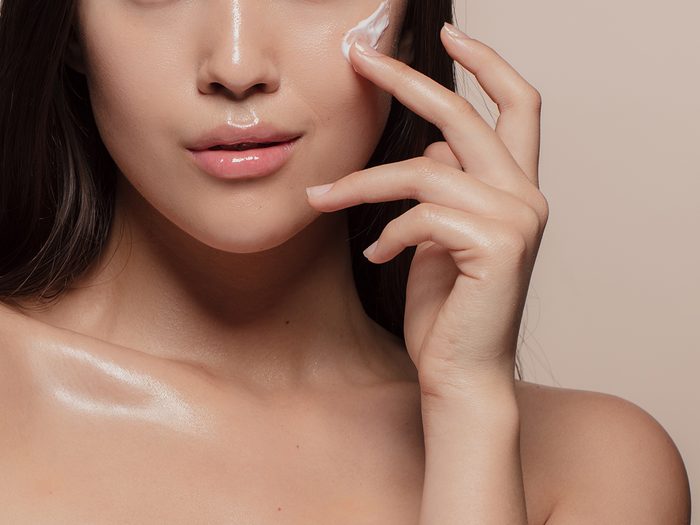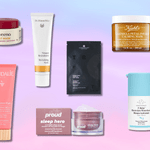Layering Skin Care Products—Am I Doing It Right?

A dermatologist shares how to layer skin care products and what you may be doing wrong.
My post-shower ritual is a well-tuned performance. I am the conductor, my skin care products the orchestra. Each product is added at a pre-determined interval for maximum absorption and efficiency. It goes something like this: After I towel dry, I pat a vitamin C serum onto my face. As that dries, I brush my teeth. Next, I apply a hyaluronic acid serum. As that seeps into my skin, I slather on body lotion. Next comes an eye cream and moisturizer. As my face drinks those up, I swipe-on deodorant, and then, comes sunscreen.
Yet, as I look at my temperamental skin with its consistent dry patches and erratic blemishes, I have to wonder—is all this necessary? Am I even doing skin care right?
“Ideally, we’d all be able to pop into a dermatologist’s office and have the doctor provide a specially formulated skin care regime for us, but honestly, there just aren’t enough dermatologists right now to be able to do that,” says Dr. Marcie Ulmer, a cosmetic and medical dermatologist at Pacific Derm in Vancouver, B.C.
So, here’s the next best thing: I asked Dr. Ulmer to share advice on how to layer skin care products, which ingredients should (and shouldn’t) be paired together and the most common skin care mistakes to be aware of.
(Related: The Benefits of a Stripped Down Skin-Care Routine)
Why is it important to layer skin care products the right way?
The reason we guide our patients on proper ordering of their skin care is so they can get the maximum benefit from each product by maximizing the absorption of the active ingredient. For example, if you were to apply something thick, like an oil, first, it’ll sit on the surface of the skin. So if you apply something afterwards, you won’t get the maximum penetration of that second layer and it wouldn’t be absorbed.
What’s the proper order?
You should apply your products starting with the lightest product and progress to applying the heaviest products. For example, in the morning, start with your cleanser, then apply your lightest product, which is often a serum. If you’re using more than one serum, go with your lightest, first. Then moisturize, which will seal in the serum, and then apply sunscreen.
(Related: Oily, Dry, or Irritated Skin? There’s a Skincare Acid for That)
How should the order of skin care products differ in the morning versus at night?
The morning routine is for protection, and the night routine is for renewal. An antioxidant serum, like a vitamin C serum, is ideal to apply in the morning because it can help protect against sun damage, free radicals and pollution. And, obviously, sunscreen is also essential in the morning routine too. The night is when you’d want to use a retinol or retinoid since they can break down with sun exposure.
Are there certain products or ingredients that should always be paired together?
Vitamin C, vitamin E and sunscreen
Both vitamins C and E are powerful antioxidants, and we like to them pair with sunscreen. Products with these vitamins, when applied in the morning, can be your line of defence. As previously mentioned, they shield your skin from sun damage, pollution and harm from free radical damage.
Water, hyaluronic acid and moisturizer
Hyaluronic acid-containing products should be applied with wet fingertips or applied onto wet skin, because this ingredient draws water in, and wet fingers or face will increase hydration. A moisturizer needs to be applied on top of hyaluronic acid to lock in the hydration.
Dry skin, retinol and moisturizer
Retinol or retinoids can be irritating and drying and should not be applied immediately after washing your face. A moisturizer should always be applied before or after a retinol or a retinoid. For those with really sensitive skin, I suggest putting on moisturizer first and then the retinol or retinoid, then moisturizer again—so the retinol product is sandwiched in between moisturizer to prevent irritation.
(Related: Bakuchiol—Why You Should Try This Retinol Alternative)
What are the most common mistakes people make when layering skin care products?
Using too many products
If your skin is red, flaky, burning or irritated, or if you’re experiencing a flare-up of an underlying skin issue like rosacea or acne, you probably need to scale back to the basics. Sometimes that means just using a cleanser and moisturizer, and then adding back one product at a time. Then, if you develop an irritation, you know which product caused it.
Using irritating products together
Retinol and exfoliants can cause redness, flaking and burning and shouldn’t be used together. Instead, use, say, a glycolic acid only once or twice a week, retinol on the other nights of the week.
Applying too much of one product
Putting on too much of one product, such as 10 drops of a serum instead of the recommended three to four, can lead to irritation. Or, you could just be wasting money. You only need a few drops to lightly cover your face.
Copying someone else’s routine
Everyone’s skin care routine should look different—it’s not going to be the same as your sister or your bestie’s because that might not be right for your skin type. Customize your routine to suit your specific skin care needs. Learn what type of skin you have—dry, sensitive, acne-prone—and make sure to use the products targeted to address your skin concerns.
How long should you wait in between applying each product?
If you can, give each product a little time to absorb before applying the next one. If you have other grooming things to do, like brushing your teeth, do so in between applying products to give each one a little more time to be absorbed. But if you don’t have time, they’ll probably still absorb just fine—as long as they’re layered in the right order.
This interview has been edited and condensed for clarity.
Now that you know how to layer skin care, learn why cryotherapy-based skin care products are currently trending.




